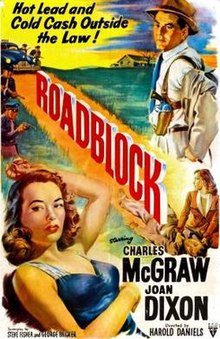Roadblock (1951 movie)
| Roadblock | |
|---|---|

Theatrical release poster
|
|
| Directed by | Harold Daniels |
| Produced by | Lewis J. Rachmil |
| Screenplay by | George Bricker Steve Fisher |
| Story by | Richard H. Landau Daniel Mainwaring |
| Starring |
Charles McGraw Joan Dixon |
| Music by | Paul Sawtell |
| Cinematography | Nicholas Musuraca |
| Edited by | Robert Golden |
| Distributed by | RKO Radio Pictures |
|
Release date
|
|
|
Running time
|
73 minutes |
| Country | United States |
| Language | English |
Roadblock is a 1951 American film noir starring Charles McGraw and Joan Dixon. The 73-minute crime thriller was shot on location in Los Angeles, California. The film was directed by Harold Daniels and the cinematography is by Nicholas Musuraca.
Insurance investigator Joe Peters (McGraw) and his partner Harry Miller (Louis Jean Heydt) solve a case and prepare to fly home. Joe meets Diane (Dixon) at an airport. She pretends to be his wife without his knowledge in order to get a large discount on the airfare. They wind up sharing a hotel room after a storm forces an unscheduled stop.
Joe is attracted to Diane, despite his dislike for "chiseler"s. She makes it quite clear she loves the finer things in life, which "Honest Joe" (as Diane calls him) cannot possibly afford on his small salary of $350 a month, so they part when they reach Los Angeles.
By coincidence, when Joe and Harry are assigned to check out Kendall Webb (Lowell Gilmore), the prime suspect in a fur robbery, Joe runs into Diane, who is now Webb's girlfriend. Their mutual attraction flares up, and Joe sets up a robbery to Webb, using his inside knowledge of a $1,250,000 cash shipment, to finance a dream life with Diane.
Ironically, Diane decides that her love for Joe is greater than her love of money. When she tells Joe she wants to get married, he tries to back out of his deal with Webb. However, Webb convinces him that Diane might not feel the same after a few months living on his paltry pay. The robbery coincides with Joe and Diane's honeymoon, giving him an alibi. Eventually, Joe confesses to Diane what he has done.
The railway mail car robbery is successful, but a railroad employee is injured and later dies. Things go downhill from there. One of the robbers is identified and arrested. Desperate, Joe arranges to meet Webb on a desolate stretch of highway by telling him he has a plan to get them out of their mess. However, after a struggle, he knocks Webb out and stages a car accident in which Webb is killed and his share of the money partially burned.
Harry figures out that his partner is involved and pleads with him to turn himself in. Instead, Joe tries to flee to Mexico with Diane, but is tracked down and shot. He dies in Diane's arms.
Hans J. Wollstein, writing for Allmovie, calls the film a "low-budget but highly engrossing film noir,". The film is indeed so low-budget that stock footage has been inserted into the scene where the car accident is set up, meaning that two distinctly different automobiles cause Webb's brutal and fiery death. Presumably the car actually being used in the film was required to be returned intact to the studio stores afterwards.
...
Wikipedia
